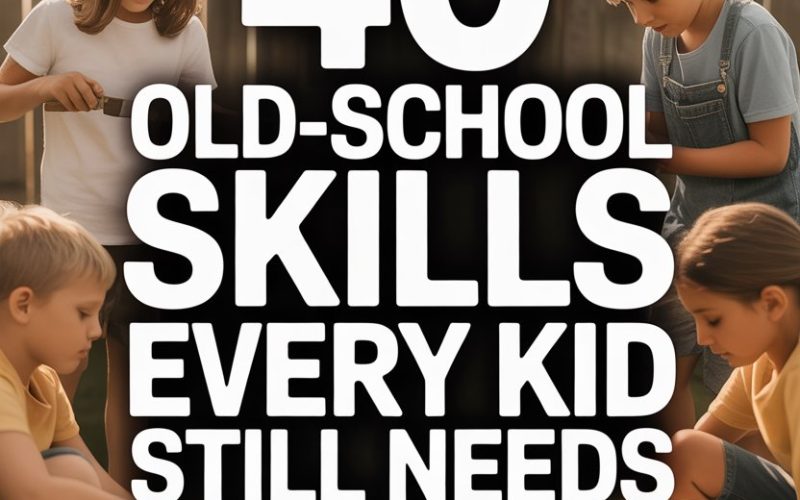Raising kids can feel like juggling flaming torches while reciting the periodic table. There’s always a new app, a new trend, and somebody on a parenting forum swearing their toddler is fluent in Mandarin and Pilates.
Amid all the digital razzle‑dazzle, there are some classic skills that still matter—maybe even more than ever. Here are the 40 old‑school skills every child deserves to master, no matter how many screens are in the house.
1. Tying Shoelaces
Velcro is handy, but there will come a day when a pair of lace‑ups will be unavoidable.
Double knots, bunny ears, the whole shebang—these are rites of passage every child should tackle, even if you have to watch that slow‑motion YouTube tutorial together.
2. Saying Please and Thank You
Politeness never goes out of style. Kids who master this one get smiles from grannies, free samples at the bakery, and, more importantly, learn that the world revolves a little smoother with good manners.
3. Writing a Handwritten Note
Penmanship might not seem crucial in the days of emojis and autocorrect, but a heartfelt thank‑you card or birthday letter still melts hearts. Plus, it’s an excuse to buy those ridiculous gel pens.
4. Reading a Map
GPS can (and will) fail at the worst possible moment. Give your kids a paper map on your next outing and let them guide you. Getting lost is half the fun—and half the lesson.
5. Memorising a Phone Number
When the battery’s dead or the phone’s at the bottom of the loo, that one number can be a lifeline. Make a game out of it: recite numbers while brushing teeth, or sing them to the tune of “Happy Birthday.”
6. Cooking a Simple Meal
The ability to rustle up scrambled eggs, a sandwich, or pasta al dente is the kind of independence that pays off long after the school years. Bonus: less chance of your teen living on microwave noodles.
7. Basic First Aid
Scrapes, splinters, or the classic Lego‑to‑the‑foot injury—kids should know how to clean a wound, stick on a plaster, and when to ask an adult for help.
The British Red Cross baby and child first aid resources turn it into a kid‑friendly learning adventure.
8. Telling the Time on an Analogue Clock
That ticking wall clock is more than home décor. Reading time without a screen teaches patience and a sense of, well, time. It’s also a neat trick for maths skills.
9. Sewing a Button
Buttons go rogue just when you need them most. Learning to thread a needle and do a quick repair saves the day (and your wallet).
10. Swimming
Pools, beaches, puddles after rain—water is everywhere. Swimming isn’t just fun; it’s life‑saving. Check for lessons at your local pool, or if your back can handle it, start in the bath.
11. Folding Laundry
That mountain of socks and shirts won’t fold itself—much as we all wish it would. Start with T‑shirts, work up to the mysterious fitted sheet, and soon you’ll have a little laundry ninja in the house.
12. Writing a Formal Email
One day, your child will need to ask a teacher for help or apply for a job. Knowing how to write a polite, clear message sets them apart from the emoji‑only crowd.
13. Riding a Bike
Balance, confidence, and the wind in your hair—cycling is a childhood classic for good reason. It’s also a handy skill for getting around, no Uber required.
14. Playing a Board Game
Fair play, taking turns, and the art of graceful losing (or not‑so‑graceful, for some of us) all come with a round of Monopoly or chess. Board games teach patience and problem‑solving, no Wi‑Fi required.
15. Speaking Up for Themselves
Self‑advocacy isn’t just for grown‑ups. Kids who can express their needs, say no, or ask for help are better equipped for life’s little curveballs. Practise with role‑play at home—bonus points if you do silly voices.
16. Making Eye Contact
In a world of screens, eye contact is almost a superpower. It signals confidence and helps kids connect with others. You can start with silly staring contests if it feels awkward.
17. Navigating Public Transport
From catching the bus to reading a train schedule, these skills unlock independence. Next time you travel, let your child lead the way (and try to keep your panic to a whisper).
18. Washing the Dishes
Sponge, soap, rinse, repeat. Even toddlers love bubbles—just expect a lot more water on the floor than seems possible.
19. Sharing and Taking Turns
Life is short, but the queue for the slide is long. Kids who can wait their turn, share treats, and accept not always being first are already winning at life.
20. Looking After Pets
Feeding the fish, walking the dog, cleaning the hamster cage—caring for another creature teaches responsibility, empathy, and that life gets messy (literally).
21. Making Small Talk
“Nice weather we’re having, eh?” Small talk still oils the wheels of the grown‑up world. Role‑play chats in the car or at the dinner table, and soon your child will have the gift of the gab.
22. Recognising and Managing Emotions
Big feelings can be overwhelming. Kids need words for their emotions and tools to manage them—think deep breaths, quiet corners, or a favourite squishy toy.
Experts at the Child Mind Institute offer practical advice on nurturing emotional intelligence.
23. Money Sense
Counting coins, saving for a treat, and understanding what things cost—financial literacy starts early. Piggy banks and pocket money teach lessons no app can.
24. Wrapping a Present
Tangled tape, wonky corners—gift wrapping is secretly an engineering challenge. Kids who wrap gifts feel proud of what they’ve made (even if Grandma pretends not to notice the sticky‑tape overload).
25. Doing Basic Repairs
Hammer, screwdriver, pliers—these aren’t just for the grown‑ups. Under supervision, kids can learn to tighten loose screws or hang a picture. Who knows, you might be raising the next DIY legend.
26. Gardening Skills
From planting seeds to pulling weeds, gardening teaches patience, science, and that carrots don’t actually grow in plastic bags. Window boxes count—no farm required.
27. Setting the Table
Fork on the left, knife on the right—kids who can set a table are steps ahead at family dinners and posh restaurant outings (or just impressing the in‑laws).
28. Reading for Pleasure
Not just for school assignments—reading for the joy of it broadens minds and soothes souls. Libraries exist for a reason: free books, comfy chairs, and that inimitable musty book smell.
29. Telling a Joke
A well‑timed joke can break the ice, ease tension, or just make everyone groan. Kids who develop a sense of humour are more resilient (and fun to have at parties).
30. Respecting Others’ Differences
Whether it’s culture, language, or taste in music (yep, even that phase with the bagpipes), kids who respect differences grow up to be kinder, more adaptable adults.
31. Asking Good Questions
Curiosity is a superpower. Kids who ask “why,” “how,” and “what if” learn to think critically—just brace yourself for the 8 000th “But why?” before breakfast.
32. Taking Care of Their Belongings
Backpacks, water bottles, and that one sock that always vanishes—caring for possessions builds responsibility and saves money (plus your sanity).
33. Making and Keeping Friends
Friendship is more than playdates and birthday parties. It’s about empathy, conflict resolution, and forgiveness—a set of skills worth nurturing every day.
34. Listening Actively
Hearing words is easy. Listening—really listening—takes practice. Family dinners or bedtime chats are perfect training grounds.
35. Giving and Receiving Compliments
A sincere compliment feels like magic. Teaching kids to appreciate others (and accept praise graciously) builds confidence and kindness.
36. Navigating Without a Phone
Lost in the park? No signal? Kids can learn to look for landmarks, follow their noses, and develop a sense of direction the old‑fashioned way.
37. Handling Disappointment
Life throws curveballs—missed parties, lost games, plans that go sideways. Kids who learn to cope with disappointment develop grit, an essential ingredient for adulthood.
38. Waiting Patiently
Queueing at the shops, holding for dessert, or waiting for their turn on the swings—patience is a muscle that grows with use.
39. Apologising Sincerely
Nobody’s perfect. Learning to own up, say sorry, and (here’s the kicker) mean it helps kids build stronger relationships and move on from mistakes.
40. Being Bored (Without Screens)
Boredom is not the enemy. It’s the birthplace of creativity, daydreams, and games involving only a cardboard box. Give your child space to be bored, and watch imagination bloom.
Raising a Capable Kid in the Modern World
Old‑school skills never really faded—they just got overshadowed by touchscreens and TikTok dances. A child who can write a note, make a sandwich, and treat people with kindness is ready for most things life will throw at them.
You don’t have to squeeze all 40 skills into this week. Pick one or two, laugh through the wobbly attempts, and enjoy the journey.
One day, your child might even teach you a thing or two about making life work—shoelaces and all.




